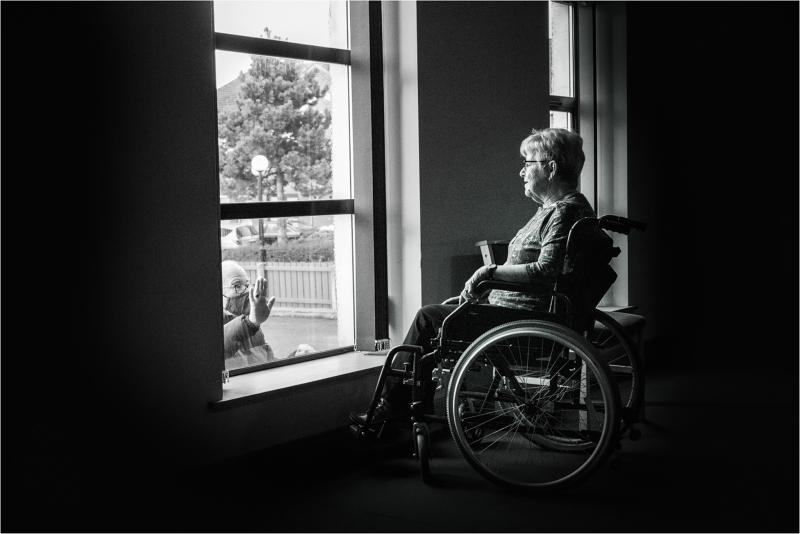
In this blog, Louise O’Connor, a research assistant at the Institute of Public Health, explores what we know, and don’t know, about mental health at population level during the COVID-19 pandemic in Ireland and Northern Ireland and considerations for the future.
The impact of the pandemic on mental health has been a topic of concern for public health leaders, politicians, service providers and carers, as well as people living with mental illness (1-3).
Increased feelings of isolation, economic uncertainty, and fear of illness, paired with a disruption to the delivery of mental health services, has changed the landscape for both developing, detecting and managing, mental ill health.
In December 2021, findings from recent population surveys in Northern Ireland (NI) and Ireland were published. These surveys explored the health and well-being of those living on the island of Ireland during the pandemic. This blog presents the findings on mental health from these surveys and captures insights from the ‘big picture’ at population level.
Assessing mental health during the pandemic
Northern Ireland
Over 1,400 people took part in the Health Survey Northern Ireland (HSNI) between June 2020 and March 2021 (4).
Participants were asked about concerns around their own mental health.
The survey also featured questions used to detect the possibility of mental health problems.
Ireland
Almost 7,500 people took part in the Healthy Ireland (HI) Survey between October 2020 and March 2021 (5).
Participants were asked about changes to their mental health.
The survey also featured questions used to detect the possibility of mental health problems.
Survey findings
Northern Ireland
The HSNI data showed that 38% of respondents had concerns about their own mental health in the past year (17% definitely; 21% to some extent), compared to 27% in 2018/19 (12% definitely; 15% to some extent).
This is reflected in a separate Coronavirus (COVID-19) Opinion Survey conducted by the NI Statistics & Research Agency (NISRA) between April-June 2021, where 38% of respondents reported having high or very high levels of anxiety (6).

Concerns about one’s own mental health increased across all age categories between 2018/19 and 2020/21, with the greatest relative change observed in younger age groups.

Over a quarter (27%) of respondents (23% males; 30% females) were identified as having a possible mental health problem[1], compared to 19% of respondents (18% males; 21% females) in 2018/19.
Those living in the most deprived areas (33%) were more likely to have a possible mental health problem than those living in the least deprived areas (23%).
Ireland
In Ireland, 30% of respondents reported that their mental health had worsened since the beginning of the pandemic, with only 5% saying their mental health had improved.
Those aged 15 to 24 (45%), as well as females (34%) and those who described their health as ‘bad’ (55%) were most likely to say their mental health had declined during the pandemic.
Four in ten respondents whose mental health had declined “a lot” had discussed the problem with a mental health professional.
The proportion of respondents identified as having a probable mental health problem[2] rose from 10% in 2016 to 15% in 2020/21.
This figure was highest in young women, with 27% identified as having probable mental health problems.
Concluding observations and implications for the future
There are some patterns evident in the nationally representative survey data.
In general terms,
- there were declines in measures of psychological and mental wellbeing;
- the distribution of harms to mental health at population level may have compounded existing mental illness inequalities;
- while older people experienced the highest level of social restrictions and health risk, their mental health appeared to be no more affected than the general population;
- females, younger adults, those living in the most deprived areas, and those who described their health as ‘bad’ emerged as population subgroups vulnerable to declines in mental health;
- these surveys were conducted during periods of strict lockdowns, and successive studies conducted in NI found that mental health improved as public health and social measures were eased (6). However, the long-lasting effects of the pandemic on population mental health remain unknown;
- there is a lack of trend data on the mental health and well-being of children and teenagers.
Mental health strategies across the island have not historically considered pandemic preparedness and there is much to learn from the impact of COVID-19.
In response, a dedicated COVID-19 Mental Health Response Action Plan was created in Northern Ireland and a new longer term Mental Health Strategy was published in 2022 including considerations for pandemic recovery (7, 8).
The World Health Organization recognises that mental health is an essential component of a nation’s response to COVID-19 and made a series of recommendations in 2021 to enhance mental health services and supports during public health emergencies (9).
These include applying a whole-of-society approach to promote, protect and care for mental health, ensuring widespread availability of emergency mental health and psychosocial support, and supporting recovery from COVID-19 by building mental health services for the future.
Gaining further insights into the mental health of people living on the island of Ireland and understanding risk factors for worsening mental health can also help to target evidence-based interventions to prevent and mitigate the negative effects of COVID-19, and other future pandemics, on population mental health.
The Mental Health Strategy for Northern Ireland can be accessed here.
The Mental Health Strategy for Ireland can be accessed here.
If you have been affected by issues raised in this blog, you can visit Mental health support | nidirect for those living in NI, or YourMentalHealth information line – HSE.ie for those residing in Ireland.
Footnotes
[1] A high score on the General Health Questionnaire (GHQ12), which is used to measure current mental health, indicates a possible mental health problem.
[2] A score of 56 or lower on the five-question Mental Health Inventory (MHI-5) questionnaire, which is used to screen for depressive symptoms, indicates a probable mental health problem.
Sources
1. World Health Organization. Mental health & COVID-19 2022 – https://www.who.int/teams/mental-health-and-substance-use/mental-health-and-covid-19.
2. Health Service Executive. Minding your mental health during the COVID-19 pandemic 2022 – https://www2.hse.ie/wellbeing/mental-health/covid-19/minding-your-mental-health-during-the-coronavirus-outbreak.html.
3. RTE News. Reports of mental health difficulties rose during Covid – St Patrick’s CEO 2021 – https://www.rte.ie/news/2021/0927/1249178-mental-health-pandemic/.
4. Corrigan D, Scarlett M. Health Survey (NI): First Results 2020/21. Belfast; 2021.
5. Healthy Ireland. Healthy Ireland Survey 2021: Summary Report. Dublin; 2021.
6. Northern Ireland Statistics and Research Agency (NISRA). NISRA Covid-19 Survey: Findings From Phases 1 to 12 of Fieldwork. Belfast; 2021.
7. Department of Health Northern Ireland. Mental Health Strategy 2021-2031. Belfast; 2021.
8. Department of Health Northern Ireland. Mental Health Action Plan. Belfast; 2020.
9. World Health Organization. 53 Member States of the WHO European Region agree to safeguard the health and well-being of their populations, now and in the future Copenhagen: World Health Organization; 2021 – https://www.euro.who.int/en/media-centre/sections/press-releases/2021/53-member-states-of-the-who-european-region-agree-to-safeguard-the-health-and-well-being-of-their-populations,-now-and-in-the-future.


